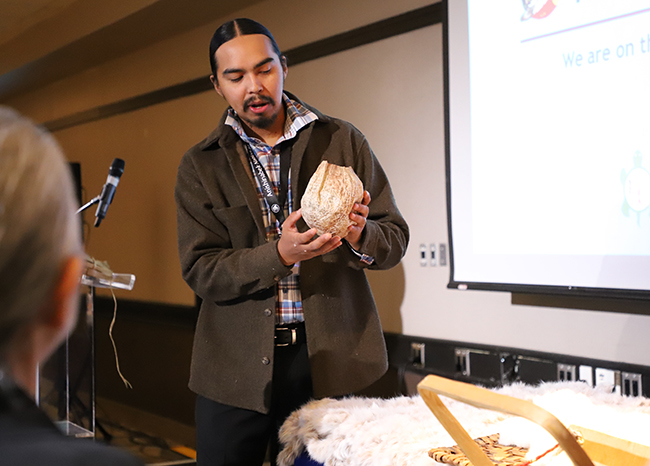Anishinabek Nation Health Conference successful for a 10th year

By Marci Becking
SAULT STE. MARIE – The 150 participants gained valuable health information at the Nimaaji-toomin Maamwii (We are on this Journey Together) 10th annual Health Conference held in Sault Ste. Marie, Ont., from Oct. 22-24.
Keynote themes included trauma and culturally-informed care, Life after loss, Anishinaabemowin, policing in our Communities, and elder abuse.
Nookmis Mary Elliott and Mishomis Mike Bisson opened the conference with a song and a prayer. The Anishinabek Nation’s Health Director, Jamie Restoule, provided opening remarks to kick-off the three-day conference.
“A lot of hard work goes into planning this conference every year. I’m incredibly proud of the Health Team for putting on another great conference,” said Restoule.
Presenter Marta Hajek, CEO of Elder Abuse Prevention Ontario, shared statistics about seniors such as they are the fastest growing demographic in Canada and that in Ontario, the 2.3 million senior population is set to double to 4.5 million by 2036 and those over 85 years of age will quadruple in population.
“50 per cent of older adults worry about losing control of their lives or being taken advantage of by those who are, more often than not, in a trusted relationship,” said Hajek. “Over 60 per cent of older adults have yet to prepare a Power of Attorney to identify a trusted substitute decision-maker to support financial or personal care decisions should they be unable to.”
Hajek also pointed out to know the signs of financial abuse.
“In order to protect each other from financial abuse, we must know the signs. These can include taking older adult’s money [sometimes by force], or selling property or values,” said Hajek. “Borrowing money without any intention of paying it back, denying services or care, and also giving away or selling the older adult’s possessions or property without their permission.”
Dr. Rennie Linklater, Senior Director of Shkaabe Makwa – Centre for First Nations, Inuit and Métis Wellness at the Centre for Addiction and Mental Health (CAMH), presented her keynote on trauma and culturally-informed care.
“When we think about our lived experience as Anishinaabe, we know that trauma has impacted us in different ways and in relationships,” said Dr. Linklater. “The present is too painful, and the past is too much to think about. There are other methods and ways that people cope with trauma. Substances, gambling, shopping, sex, social media, there a lots of different ways people are coping. It’s a trauma response.”
Dr. Linklater spoke about breaking the cycle of abuse.
“Without intervention, people reenact abuse on other people and that is the cycle of abuse. And over the next couple of decades, we’re going to have to step into these very uncomfortable spaces in a different way. That’s the only way we’re going to stop it from continuing. It’s really hard. There’s going to be a lot of people really unsure around safety. When I talk about safety, they may have to step out of their family and relationships,” continued Dr. Linklater. “Have insight into our own journeys and want to do something different. I learned from my parents what not to do. It’s an opportunity to do something different. Start looking for what can help you.”
Workshops held included topics such as Exploring Autism, Transgender Health, Overview of Dementia, 7 Stages of Life, Berry and Vision Quest, Harvesting on the Lands, Aggression toward Families and Caregivers in Childhood Adolescence, and Jordan’s Principle.
Updates were provided from Cancer Care Ontario, Responsible Gambling Program, Renal Health, and a community spotlight was provided by Beausoleil First Nation Health Director Deb Laramey.


